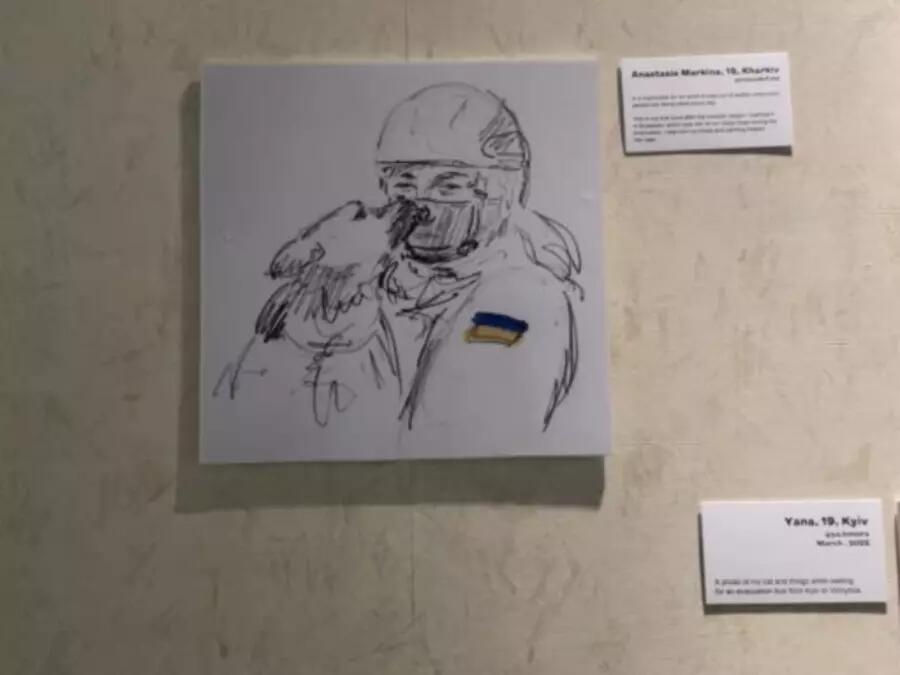
365 Days of War: Resilience, Solidarity, Creativity & Memory (Part Two)
On February 23, 2023, a public talk celebrating strength and resilience of Ukrainians in war was presented at the St. Volodymyr Institute. The event was initiated and sponsored by CERES and the Petro Jacyk Program for the Study of Ukraine, Munk School of Global Affairs & Public Policy and co-organized by KMA Global Campus at U of T, community of students and faculties from the National University of Kyiv-Mohyla Academy, Ukraine. The panel and presentations were followed by opening of the exhibitions: Traces of War, Unissued Diplomas and reception. $310CAD and on-line cost transfers collected during the event are donated for the purchase of medical supply and camera drones.
The panel started with opening speeches by Edward Schatz, director of the Centre for European, Russian and Eurasian Studies and Mychailo Wynnyckyi, vice-president on Research and Graduate Studies at the National University “Kyiv-Mohyla Academy.” The reflection on war that have changed the world and revealed outstanding examples of resilience, solidarity and creativity of Ukrainian people was continued by presentations by the faculties and students from the National University of Kyiv-Mohyla Academy.
Liudmyla Kryvoruchka, Director of Yuchemenko Family Doctoral School, was discussing various indicators of resilience in the society living through devastating war such as statistics and indexes measured by surveys, capability to continue work, volunteering, teaching and learning at the frontline, creating art, poetry and books publication. She made emphasis on symbols of resilience emerged in realities of war, developed by media and embedded in everyday communication of Ukrainians as grounding points for further strengths and internal source of hope and light and will be kept as visual history of the current war. Ukraine became the center of the world and established new measurements and indexes of resilience, solidarity and creativity.
Dmytro Yefremov, associate professor in the International Relations Department, identified four miracles that helped Ukraine to stay afloat: 1) banking miracle (stabilization of situation and growing trend in bank deposits); 2) exchange rate stability (the balance of payments remains afloat, and the hryvnia devalued by only 25%); 3) Ukraine continues to fulfill its obligations to the population and other borrowers; 4) stabilization of the energy situation.
“No strategy of appeasing the aggressor, no neutrality will save you from bad neighbors. To respond to an external challenge, you must be prepared internally. We need reforms, deregulation, and digitalization that will help overcome our shortcomings,” mentioned Dmytro in conclusions.
Olena Primierova, associate professor at the Faculty of Economic Sciences, continued the story of solidarity with the Ukrainian people under the threats of war. Olena shared her own experience of volunteering and spoke about the thousands of important initiatives that were launched on different levels to support the military and civilians. She demonstrated how grassroots initiatives, such as volunteer groups and civil society organizations, massive donations and incredible fundraising have played a critical role in providing assistance and support to defenders and those affected by the war, and have helped to build a sense of shared purpose among Ukrainians. She noted the importance of international support and solidarity with most countries of the world: "Canada, the United States and our European neighbors stand by us in this struggle for peace, democratic values and human rights. Solidarity and determination of Ukrainian people with continued support from the international community, offer hope for a peaceful and prosperous future for Ukraine and the whole world."
Tetiana Fedosieieva, associate professor at the Faculty of Law, presented her view of creativity during this war. Fedosieieva discussed the involvement of state institutions, businesses and citizens in considering issues related to creative industries–highlighting the creative achievements of Ukrainians in international exhibitions and festivals. Lastly, she spoke about uniting Ukrainian communities, which opened the doors of their cultural centers for people who have been relocated. Special attention was paid to the projects supporting the army and artists, such as the theater project by the military and volunteers.
Daryna Zavhorodnia, third year Sociology student and manager of “Unissued Diploma”– a project that was developed by a team of more than 50 students (from KMA Global Campus and many universities worldwide), talked about the stories of the lost precious lives of her peers represented in images of two exhibitions: “Traces of War” and “Unissued Diplomas.”

